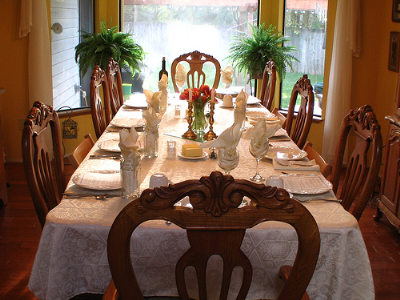
Each week I look forward to the coming Shabbos and the opportunity to enjoy a beautiful meal filled with my wife’s delicious delicacies and surrounded by my family and usually lots of guests. When else in this hectic world of obligations and distractions do we sit for hours on end completely disconnected from technology and entirely focused on the people with whom we are dining and conversing?
Hachnasas orchim, hosting guests, is a basic Jewish value and Torah imperative. Whether deepening the relationship with existing friends, making new friends or hosting those who need a place for a meal, offering hospitality is not only a chesed for others, but is enriching for ourselves and importantly for our children.
That said, too much of even a good thing often comes with a downside. When we host guests, from the way we arrange the seating to the topics of conversation at the table, we often make them our priority and unintentionally, neglect our children in the process, missing out on a crucial educational platform and opportunity.
Many people approach Shabbos as the time to let go, relax and shut down when in truth, in some ways it is the time we should be most on, energized and focused on our goals. I recently had a conversation with a childhood friend who currently lives in Los Angeles. Impressed by the devotion and religious passion of his children, I asked him why he thought they were doing so well? His answer left a great impression upon me.
While most people come to the Shabbos meal utterly exhausted and somewhat dispirited, he makes sure to use his Shabbos table as the ultimate classroom for his children. He approaches each meal with a predetermined agenda including a compelling dvar Torah, a stimulating question, a relevant story that his children can relate to and the zemiros they will sing. He has a series of values, ideals and lessons that he desperately wants to impart to his children before they graduate his home and he feels strongly that there is no better place or time than the Shabbos table to communicate them.
Rabbi Paysach Krohn tells a story he heard from a cheder (kindergarden) teacher. One Friday, the class was hosting their weekly Shabbos party. The designated Shabbos Abba took his place at the head of the table and after pouring him his cup of grape juice, the teacher indicated that he should begin to recite Kiddush. The little boy took a deep breath, wiped his brow and declared, “Oy have I had a hard week” and only then made Kiddush. Clearly the child was emulating what he had become accustomed to see in his home.
Whether we recognize it or not, our Shabbos table is perhaps the most impactful classroom in our children’s lives and we are their most influential teachers. Will they come to their Shabbos table with a krechtz and a sigh or be energized and enthusiastic? The answer depends largely on what they see from us.
It is important to continue to host guests and practice hachnasas orchim. However, I submit to you that it is even more important to spend at least one meal each Shabbos alone with our children, prepared and equipped with a lesson plan for our informal classroom.